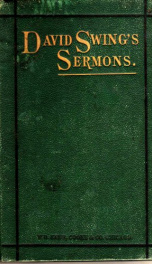david swings sermons

David Swing was born in Cincinnati, Ohio, on August 23,1830, the son of an Ohio River steamboat skipper. Both of his parents came to this country from Germany. His father died of cholera in 1832, and he was raised by his mother, a devoted Christian woman whose influence and teaching marked his life and career. He grad- uated from Miami University in Oxford, Ohio, in 1852. After two year's study of theology in Cincinnati, he returned to his alma mater to teach Latin and Greek. Swing was called to the Westminister Presbyterian Church of Chicago in 1866. His sermons there attracted people from every part of the city, regardless of church affiliation. When his congre- gation later united with the North Presbyterian Church, he be- came pastor of the unified Fourth Presbyterian Church, serving that congregation from 1871 to 1874. In October 1871, the Great Chicago Fire destroyed the homes of all but two of his congrega- tion as well as the church building itself. The scattered congrega- tion began meeting in Standard Hall and later moved to the McVicker's Theatre to accommodate the growing number of peo- ple coming to the services. Swing resumed preaching at the rebuilt Fourth Presbyterian Church in 1874. Later that year heresy charges were brought against him by the Reverend Francis L. Patton of the Chicago Theological Seminary. The resulting trial was followed in news- papers throughout the country. Although he had the support of a large part of his congregation, the bitterness of the struggle led him to resign his pastorate. Within a week of his resignation, and with the support of many of Chicago's leading citizens, some of whom were members of the Chicago Literary Club, arrangements were made on his behalf for the immediate establishment of a new church. A forceful intellect and a popular theologian, he was referred to by an admirer as "the Emerson of our American pulpit."
Info about the book
Author:
Series:
Unknown
ISBN:
1175781568
Rating:
4.5/5 (3)Your rating:
0/5
Languge:
English
Users who have this book
Users who want this book
What readers are saying
What do you think? Write your own comment on this book!
write a commentif you like david swings sermons try:
Do you want to exchange books? It’s EASY!
Get registered and find other users who want to give their favourite books to good hands!





